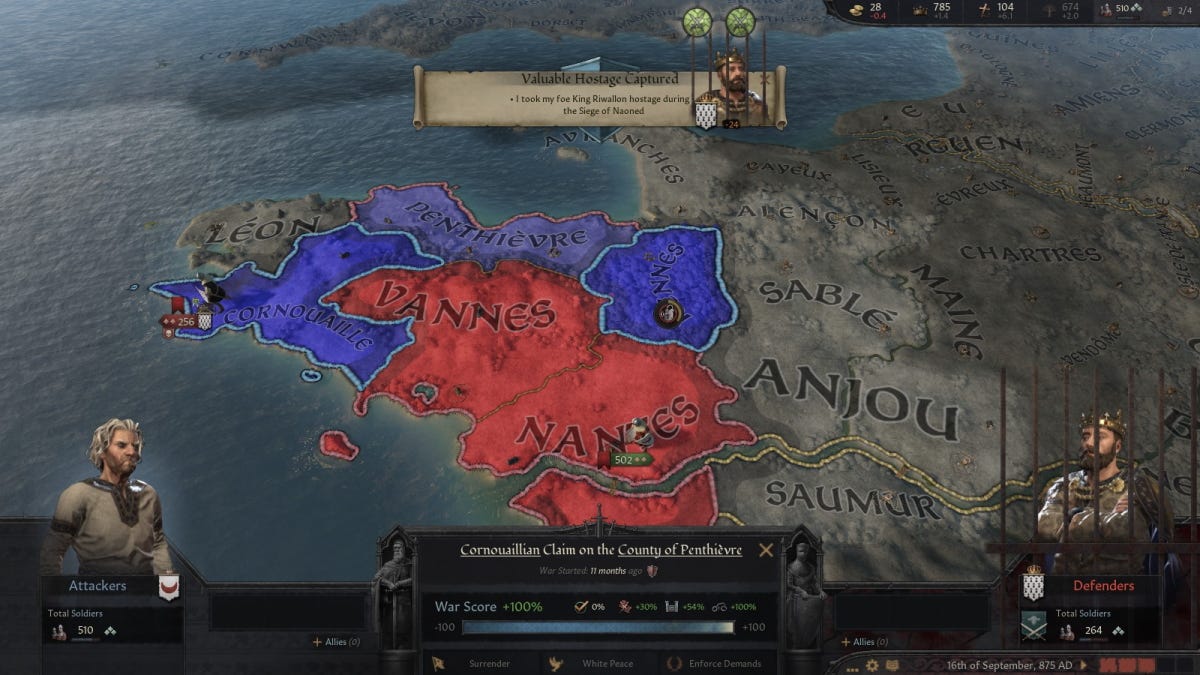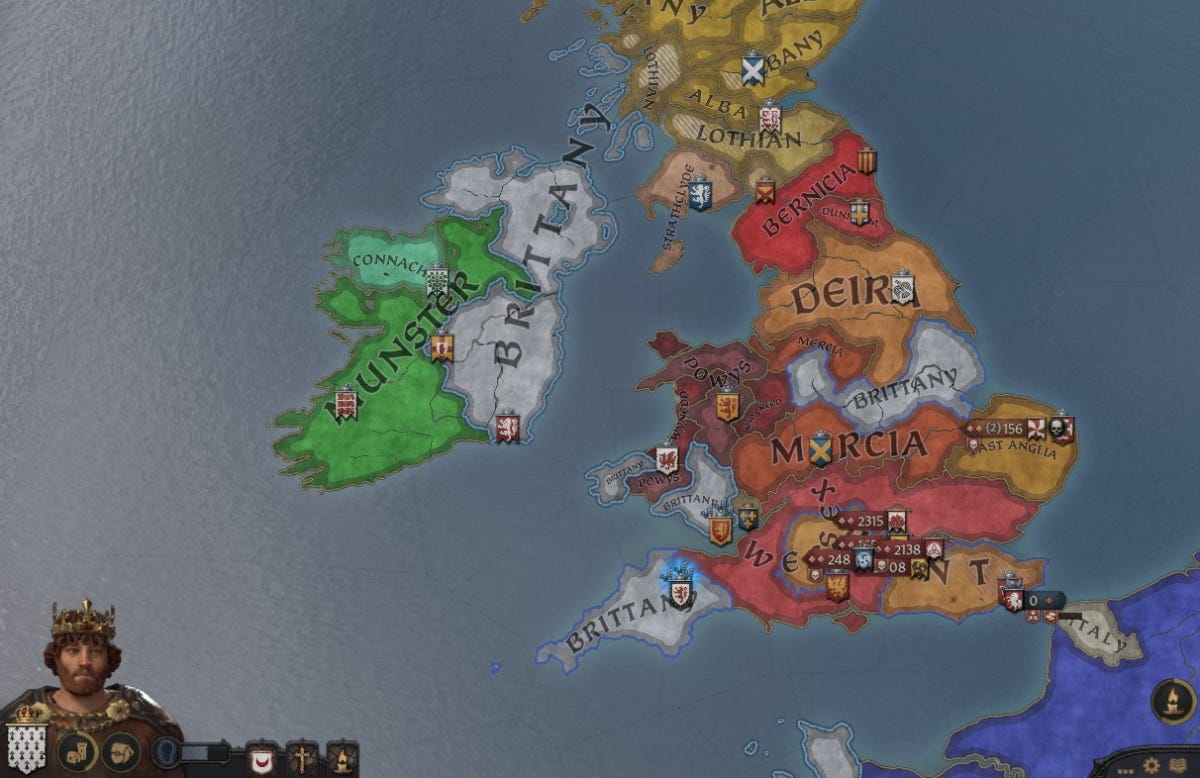A couple of years ago, I decided that I wasn’t going to buy any more titles from Paradox Games, because they always come with the assumption that you’re going to spend the ticket price again on DLC, and they’ll be along in the Humble Choice some time anyways. The only time I’ve ever been tempted to break that promise to myself was on the release of Crusader Kings III, but thankfully, just one year and a few days after initial release, Humble came through for me yet again.
I can think of no better way to celebrate than to dive right in to my traditional favourite starting spot, the Duchy of Brittany, and see how different this game is to its predecessor, Crusader Kings II, which I have played the heck out over the years. So I loaded in to the 867AD start date as:
Count Alfrond mab Gestin of Cornouaille
The situation in the Kingdom of Brittany is tense. King Salomon is anxious to consolidate his personal power as a bulwark against the rising influence of the French King to the East, so he turns his greedy eyes upon the lands of his vassals. When he attempts to seize the territory of Prince Pascueten of Vannes, brother of his predecessor as King, his vassals Princes Pascueten, Prince Guruant of Rennes and Count Alfrond of Cornouallie rise up against him as one and narrowly defeat his forces in the field, forcing him to abdicate his throne in favour of his son, the new King Riwallon. Riwallon, being his father’s son, soon attempts something similar, and is eventually forced by the Princes to abdicate in favour of his own son Alan in turn, but Count Alfrond takes advantage of their depleted military forces by seizing Rennes in 871. When Alan also attempts to participate in the fine family tradition, he is also forced to abdicate by Princes Pascueten and Guruant to abdicate the throne, and Count Alfrond again takes advantage of the situation and seizes the County of Pentievre from the weakened royal family in 875. When he dies at age 79 in he now controls the largest military force in Brittany, even as Pascueten finally ascends to his brother’s throne.
At first glance, the games and their mechanics are almost identical. The county borders are the same, the colour palette is the same, the music features revamped versions of the same tracks. It's so similar that Mrs. Owl, not traditionally someone who notices much detail about a video game, walked by when I had it open and wondered why I was playing that old game again. There are definitely differences, but Paradox has definitely gone the “if it ain't broke don't fix it” route with this one. My question, though, is if it ain't broke, maybe it didn't need to be replaced, either?
King Ulfret mab Alfrond of Brittany
Ascending to two of his father’s three counties at the age of 39, Count Ulfret, a diplomatic genius, quickly moved to continue the good work that his father had begun, disposing of the last power base of House de Rennes and establishing himself as Duke and finally as King of Brittany by August 895. After his young wife Perienne died in a siege laid by the neighbouring Earl of Léon, he married Cnes, a woman of low birth who was acting as his physician, but some say that he never forgot his first love, and that he began the crusade that would last most of the rest of his life in her honour. He would live to see the capture of the county of Léon for Catholicism from the grasp of the Ásatrú pagans, finally uniting all of Brittany from Ushant to the Loire.
All the mechanics you know and love from CKII make an appearance, the council, claims and warfare, buildings, and the tweaks to all of these are solid and sensible without being groundbreaking. Each region has been broken down into subregions for each settlement, which provides an extra level of micromanagement for armies. I'm not completely convinced that this is a good change, as the army micro is still as uninspiring a part of the game as it has always been, but I can imagine that the additional tactical possibilities are interesting to someone out there. My main complaint about this sub-regional change to the map is that it means that it's harder to navigate and interact with settlements, particularly as the ruler UI gets in the way, so I find myself longing for the ability to use something akin to a Civilisation VI's strategy view rather than the more realistic map of the default game.
Queen Tandrec ‘the Kind’ of Brittany
With Brittany secured, the only daughter of King Ulfret, groomed from a young age to take over his throne, rules the Kingdom for 37 years, presiding over a period of great unity and expansion. After securing Brittany’s borders from the heathens by capturing Montaigu, she maintained good relations with the splintered French kingdoms to the east, and instead aimed her advances to the North, securing territory in Cornwall, eastern Ireland and southern Wales by exploiting alliances gained with the Petty Kings of Wessex and East Saexe by marrying them to her daughters.
In another change that I'm not sure I love, fleets have been removed from the game, so armies can just travel over water wherever and however they want to. I see the reason for this simplification, but it does mean that each region is much like any other for defensibility purposes, and that you're much more likely to be swamped by distant allies of your enemies called into your wars. Some of the other simplifications and demystifications of systems, like the progress bars for your schemes and council actions, are huge steps forward, so I guess I’ll just have to trust that this is a positive change too.
King Alfond ‘the Impaler’ of Brittany
With the nickname ‘impaler’ earned during his wars durign his long wait as heir to the throne, King Alfrond and his brother and right hand Duke Iudon of Cornwall ruled with an iron fist. Though his short reign saw the greatest extent of the borders of Brittany thus seen, pushing into parts of northern England and Ireland and southern Scotland, Alfrond’s political machinations, particularly his plotting to see his nephew by his youngest sister Anauhouguel crowned King of France and Lotharingia, caused him to be widely feared both inside and outside Brittany, and the stress involved may have eventually resulted in his early death at the age of just 55.
For me, the best new addition is the stress system, which penalises the characters for acting against their nature. In CKIII you can’t just try to develop a friendly and just character for the stat bonuses, as doing so will come with massive penalties if you ever want to do anything underhanded like murder or torture, and this is Crusader Kings that we’re talking about, so you generally want to do things like that on a regular basis. This forces you to play the game in different ways based on your player character’s predilections, which adds a lot of variety. I haven’t managed to have any truly terrible stress-related travesties happen to me just yet, but I look forward to experiencing them.
King Mortiern mab Alfrond of Brittany and Wales
In contrast to his father’s close partnership with his brother Duke Iudon of Cornwall, King Mortiern’s reign was marked by ongoing struggles for control with his vassals, particularly Duke Iudon’s son Pêr, whose holdings through his mother’s inheritance in northern England made him arguably the most powerful man in the country. Mortiern was on the back foot from the beginning, losing his father’s Duchy to his brother Prince Matuid, and the County of Vannes, seat of much of his military power, to the control of his younger brother Prince Gestin, and being forced to marry his aunt Condeleu to secure his position. Though Mortiern managed to stay above water through the careful application of influence and even managed to grow his control in Wales during his reign, his political weakness and some hasty appointments resulted in the Duchies of Ulster and Strathcylde passing out of the control of House de Cornouaille, and boded ill for the reign of his unpopular and crippled son Conogan when he ascended the throne.
The change that I find most frustrating is the gating of many mechanics behind cultural and historical innovations, meaning that any meaningful progression through the game is glacially slow, particularly with an early start date in a less developed place like, I dunno, Brittany. While it makes a lot of sense historically, locking different types of succession behind technology, something that is more or less out of the player’s control, greatly reduces the options in the game. For an example, by now in CKII I’d almost certainly have instituted Primogeniture, or at least Tanisty, but in CKIII I’m stuck with Gavelkind and a fracturing realm for the forseeable future, and with very little control over which titles will be inherited by which children, which sometimes has confusing and irritating effects. Overall, I like the concept of the meaningful tech and innovations development that they’ve got going on here as a grand strategy idea, but it does really slow things down, and I haven’t yet decided if that’s a positive or not.
King Conogan mab Condeleu of Brittany and Wales
No sooner had Prince Conogan become King than he had to contend with an invasion from the pagans of the Kingdom of Deira, aided by the Irish warlords that his father had failed to convert and pacify. Though this threat was neutralised, it cost Conogan political influence with his allies and a large portion of his armies to keep the realm united, and this weakness was seized upon by the vassals that had been circling in the water during his father’s reign. Though a challenge for the throne by his uncle Prince Maturid was seen off, the same could not be said for that of Duke Pêr, who successfully achieved Cornish independence from the Breton throne, leaving Conogan with only the County of Kent of all the Kingdom’s previous holdings in England. On Conogan’s inevitable early death due to his deformities, his dual crowns of Brittany and Wales will likely be split between his two young sons Mortiern and Caradoc, further splintering the once-fearsome de Cornouille power base.
I like Crusader Kings III a lot, and if I hadn’t already played CKII I’d definitely say that jumping on this bigger, flashier version of the staring at maps simulator was definitely worth it. Since I do have CKII and a number of the expansions, though, I have to say that I don’t think that CKIII is worth the $69.95 AUD, let alone the $40 or so you’ll have to shell out for each expansion if you want to play it close to the release date. For the $16.95 pricetag on the Humble Choice, however, this is an absolute gimme.






